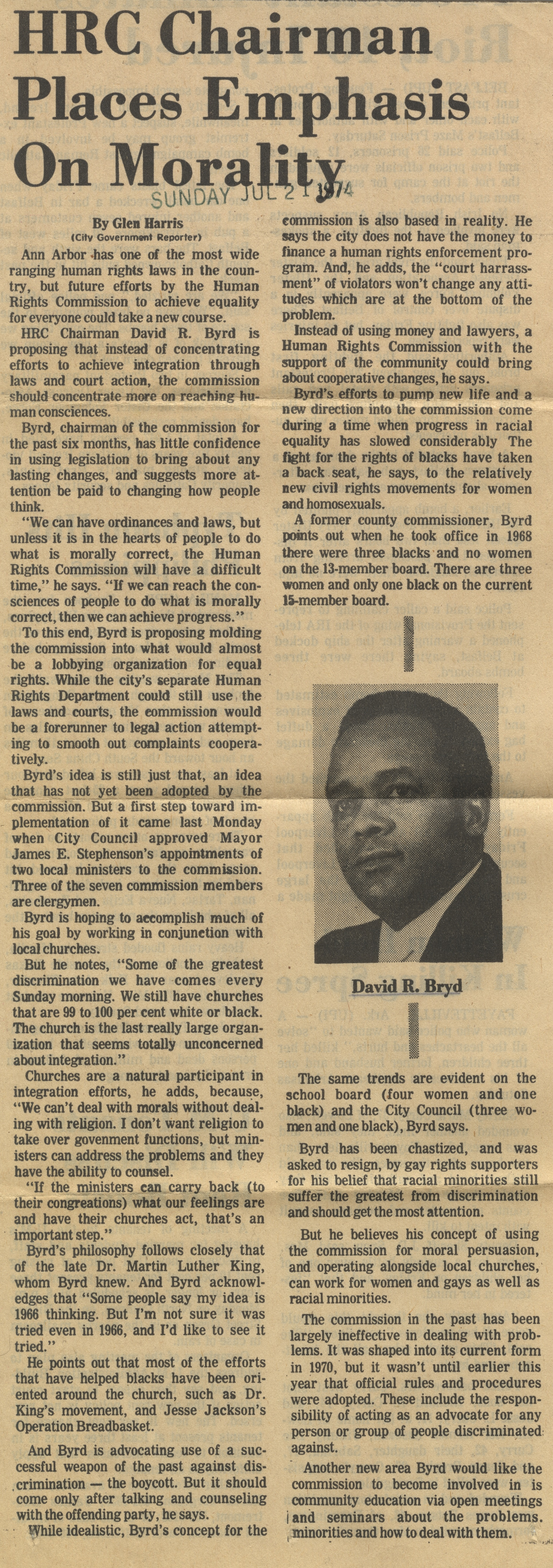HRC Chairman Places Emphasis On Morality

HRC Chairman Places Emphasis
SUNDAY JUL 21 1974
By Glen Harris
(City Government Reporter)
Ann Arbor has one of the most wide ranging human rights laws in the country, but future efforts by the Human Rights Commission to achieve equality for everyone could take a new course.
HRC Chairman David R. Byrd is proposing that instead of concentrating efforts to achieve integration through laws and court action, the commission should concentrate more on reaching human consciences.
Byrd, chairman of the commission for the past six months, has little confidence in using legislation to bring about any lasting changes, and suggests more attention be paid to changing how people think.
“We can have ordinances and laws, but unless it is in the hearts of people to do what is morally correct, the Human Rights Commission will have a difficult time,” he says. “If we can reach the consciences of people to do what is morally correct, then we can achieve progress. ”
To this end, Byrd is proposing molding the commission into what would almost be a lobbying organization for equal rights. While the city’s separate Human Rights Department could still use the laws and courts, the commission would be a forerunner to legal action attempting to smooth out complaints cooperatively.
Byrd's idea is still just that, an idea that has not yet been adopted by the commission. But a first step toward implementation of it came last Monday when City Council approved Mayor James E. Stephenson’s appointments of two local ministers to the commission. Three of the seven commission members are clergymen.
Byrd is hoping to accomplish much of his goal by working in conjunction with local churches.
But he notes, “Some of the greatest discrimination we have comes every Sunday morning. We still have churches that are 99 to 100 per cent white or black. The church is the last really large organization that seems totally unconcerned about integration.”
Churches are a natural participant in integration efforts, he adds, because, “We can’t deal with morals without dealing with religion. I don’t want religion to take over government functions, but ministers can address the problems and they have the ability to counsel.
“If the ministers can carry back (to their congregations) what our feelings are and have their churches act, that’s an important step.”
Byrd’s philosophy follows closely that of the late Dr. Martin Luther King, whom Byrd knew. And Byrd acknowledges that “Some people say my idea is 1966 thinking. But I’m not sure it was tried even in 1966, and I’d like to see it tried.”
He points out that most of the efforts that have helped blacks have been oriented around the church, such as Dr. King’s movement, and Jesse Jackson’s Operation Breadbasket.
And Byrd is advocating use of a successful weapon of the past against discrimination — the boycott. But it should come only after talking and counseling with the offending party, he says.
While idealistic, Byrd’s concept for the
commission is also based in reality. He says the city does not have the money to finance a human rights enforcement program. And, he adds, the “court harassment” of violators won’t change any attitudes which are at the bottom of the problem.
Instead of using money and lawyers, a Human Rights Commission with the support of the community could bring about cooperative changes, he says.
Byrd’s efforts to pump new life and a new direction into the commission come during a time when progress in racial equality has slowed considerably The fight for the rights of blacks have taken a back seat, he says, to the relatively new civil rights movements for women and homosexuals.
A former county commissioner, Byrd points out when he took office in 1968 there were three blacks and no women on the 13-member board. There are three women and only one black on the current 15-member board.
David R. Bryd
The same trends are evident on the school board (four women and one black) and the City Council (three women and one black), Byrd says.
Byrd has been chastised, and was asked to resign, by gay rights supporters for his belief that racial minorities still suffer the greatest from discrimination and should get the most attention.
But he believes his concept of using the commission for moral persuasion, and operating alongside local churches, can work for women and gays as well as racial minorities.
The commission in the past has been largely ineffective in dealing with problems. It was shaped into its current form in 1970, but it wasn’t until earlier this year that official rules and procedures were adopted. These include the responsibility of acting as an advocate for any person or group of people discriminated against.
Another new area Byrd would like the commission to become involved in is community education via open meetings and seminars about the problems, minorities and how to deal with them.
Article
Subjects
Glen Harris
Washtenaw County Commissioner
University of Michigan - Faculty & Staff
Racial Equality
Racial Discrimination
Operation Breadbasket
Integration
Civil Rights Movement
Boycotts
Ann Arbor Board of Education
Ann Arbor Human Rights Commission
Ann Arbor City Council
Black Americans
Black American Community
Has Photo
Old News
Ann Arbor News
Martin Luther King Jr.
Jesse Jackson
James E. Stephenson
David R. Byrd